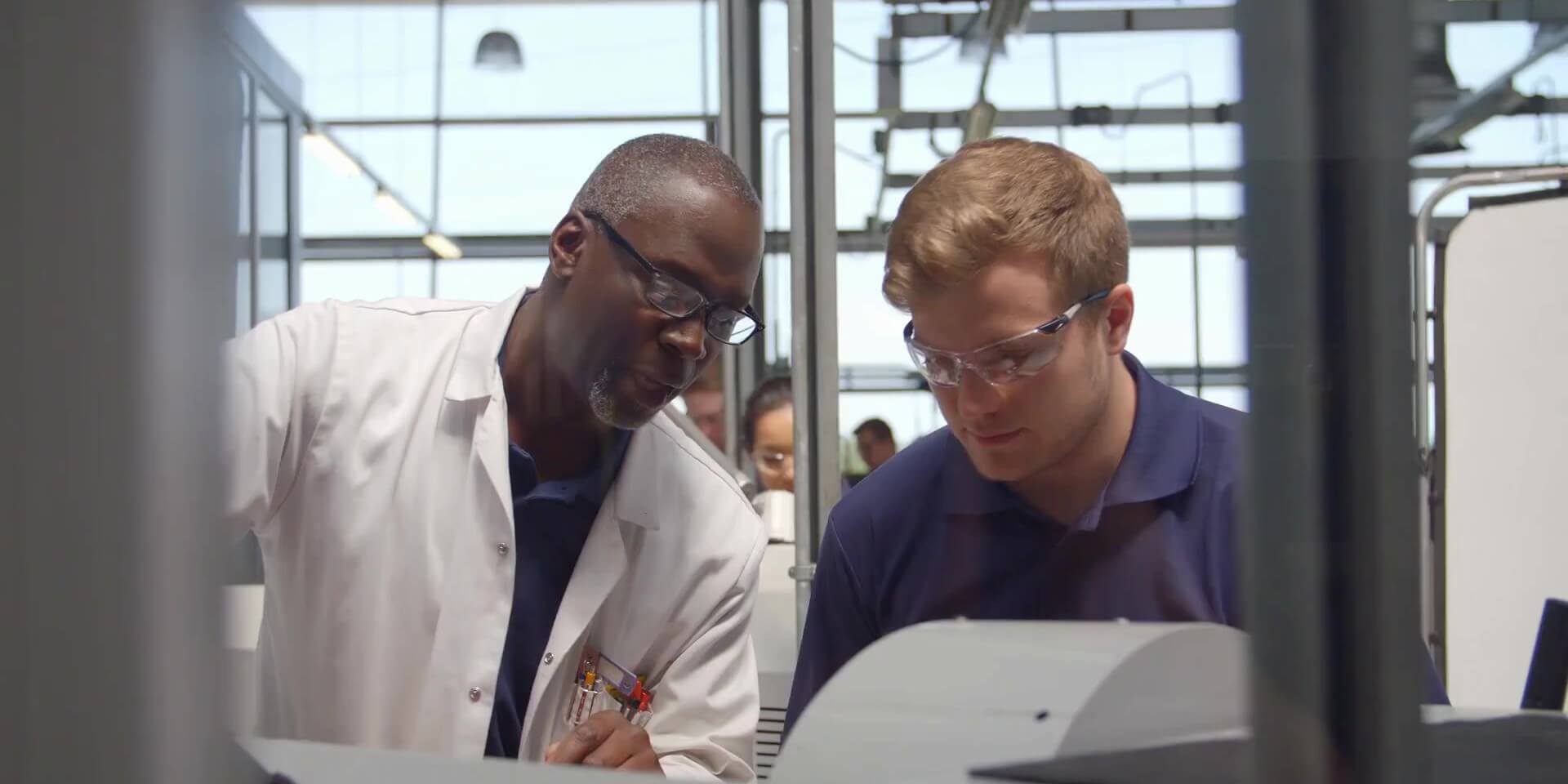NOCTI and Nocti Business Solutions (NBS) proudly serve as key players in the National Coalition of Advanced Technology Centers (NCATC) Strategic Partner Network, a dynamic alliance of over 160 members spanning community and technical colleges, universities, high schools, adult education organizations, and the corporate community. Together, we are shaping the future of advanced technology.
NCATC is an Affiliated Council for the American Association of Community Colleges (AACC), serving on the Commission for Economic and Workforce Development. The NCATC works with its Strategic Partners to “advocate, advise, and promote the use of advanced technology applications to enhance economic and workforce development programs and services.” Central to this mission are NCATC’s four strategic pillars, which are critical to shaping the current and future workforce:
- Pillar 1: Future of Workforce: Industry 4.0/x.0, Advanced Technology, Smart Automation & Manufacturing
- Pillar 2: Apprenticeships, Work-Based Learning, and Entrepreneurship in Workforce Development
- Pillar 3: Competency-Based Learning and Industry-Recognized Credentials
- Pillar 4: Adult Education & Learning Opportunities | Access, Diversity, Equity, Inclusion & Belonging
While NOCTI supports all of NCATC’s strategic pillars, our strengths are most closely aligned with competency-based learning and industry-recognized credentials. With over 55 years of expertise in creating and delivering industry credentials and resources for Career and Technical Education (CTE) programs, NOCTI is committed to preparing students for their chosen careers.
Our team had the opportunity to speak with Craig McAtee, Executive Director & CEO of NCATC, about competency-based learning, industry credentials, current barriers to workforce development, and how schools can equip students with industry-relevant skills.
Competency-Based Learning and Credentials Go Hand-In-Hand
We asked McAtee about the challenges in utilizing the classroom setting to meaningfully prepare students for the workforce. Rote memorization can help students pass standardized tests, but how much of that is applicable to a future job or career?
“We’re doing a math test from formulas on a whiteboard,” says McAtee. But “industry does not want you to be able to pass a test. They want you to be doing applied learning.” These students need to learn in a way that allows them to apply their skills to real-world situations. For NCATC and NOCTI, these real-world skills come through competency-based learning and industry-recognized credentials.
Competency-based learning, in McAtee’s words, means “teaching and assessing in a framework that focuses on the student’s ability to apply their knowledge and skills in a real-world situation.” It’s not just about getting high scores on standardized tests—it’s about preparing each student to enter the workforce. It’s about equipping them with the tools to not only support themselves but also thrive in their careers. Educators must focus on practical skills and real-world experience that will empower students to succeed beyond the classroom.
Industry-recognized credentials provide a clear measure of a student’s employability and readiness for the real world. Credentials that are recognized and used by various industries can show that students have useful knowledge, skills, and abilities to step directly into their careers. They can enhance resumes, boost student confidence when entering the workforce, and support employee retention. Independent organizations like NOCTI offer reliable, unbiased, and high-quality assessments and credentials to accurately measure and validate these essential skills.
Current Barriers to Future Workforce Development
NCATC is a highly respected organization, providing support for workforce development programs, fostering networks for members to share ideas, and raising awareness of the positive impact of CTE programs. However, challenges remain in increasing awareness around the benefits of competency-based learning and industry credentials.
Many educators are accustomed to traditional teaching methods, making it difficult to shift away from that familiar classroom environment. This is especially challenging in an era of rising teacher burnout. As the effects of the pandemic continue to impact education, the added challenge of a new style of education can be met with some resistance from faculty already grappling with these changes.
In addition, higher learning commissions often move at a much slower pace than industries. As technology rapidly evolves, changes made by these commissions can become outdated before they are implemented. McAtee emphasizes, “we need colleges to work at the speed of business.”
McAtee also noted that the traditional “time-based” education model is outdated and doesn’t support students who learn at different paces. Rather than requiring all students to complete the same number of credit hours to verify their knowledge, educators should meet students where they are. One student may reach competency in 10 hours, while another may need 50 hours, based on their learning style and critical thinking skills. The focus should be on proving depth of knowledge through competency assessments, not just logging classroom hours.
What Can Schools and Colleges Do?

While change can be challenging, it becomes more manageable with a clear and straightforward plan. We asked McAtee what steps educators can take to help their classrooms prepare for the workforce.
Hands-on learning: McAtee is a big proponent of this learning approach, advocating that at least 60% of a student’s time be dedicated to experiential learning. This could be either with real-world equipment in a training lab or engaging with virtual/augmented reality. This hands-on method directly prepares students for the situations they may encounter on the job.
Get business and industry involved: Replace 20th-century advisory committee models and adopt a co-leadership approach, like NCATC supported Business and Industry Leadership Team (BILT) by CORD funded by NSF. In the traditional model, industry leaders would listen to faculty presentations. In the new model, they take an active leadership role, guiding the future trends of the program and shaping the course outcomes. Business and industry can define the knowledge, skills, and abilities the future workforce needs, aligning education with real-world job requirements.
Third-party certifications: Educators should not be developing their own assessments or credentials, as it’s challenging to expect unbiased results from the same body that certifies. An independent credential is the most reliable way to validate knowledge, skills, and abilities for competency in real-world situations. Utilizing an independent organization like NOCTI, which specializes in high-quality, practical assessments, is the right approach to ensuring a program’s validity.
McAtee told us about Ivy Tech as an example of competency-based learning. “Ivy Tech, for the last 20 some years, has really worked in a BILT model without even calling it that. They’ve done an amazing job with the Ivy Tech community college system to integrate and embed the industry’s needs and knowledge, skills and abilities as well as industry-recognized credentials.”
Ivy Tech’s programs have a variety of industry-recognized credentials built in their courses, paired with specific career options. Prospective students can choose which career/credentials would be a good fit, with upfront costs and program hours. Not only is this a great jump-off point for someone who is just beginning their career, but it is also a perfect opportunity for the existing workforce to upgrade their skills in a meaningful way.
How NOCTI Develops High-Quality Credentials
Promoting third-party skills evaluators is a high priority for NCATC. Part of the challenge is driving awareness of the advantages of independent credentialing organizations like NOCTI. Many educators don’t understand the rigorous certification development process and the number of experts who contribute to each credential.
For NOCTI, the process for developing a high-quality certification looks like this:
- A multi-day workshop to develop the standards and define critical skills for the assessment. The sessions include subject matter experts (SMEs) from various organizations with a stake in the outcome.
- Assessment questions are developed by SMEs under the guidance of an experienced psychometrician—an expert in measurement, assessment, and testing—to ensure a fair and unbiased evaluation that accurately validates skills and abilities.
- After development, the assessment undergoes a thorough pilot testing phase, during which data is collected on individual test items and the overall assessment. Once pilot testing is complete, the data is analyzed to refine the assessment and establish a legally defensible cut score.
What distinguishes NOCTI from other assessment development organizations is its accreditation from the International Certification Accreditation Council (ICAC). This accreditation ensures a neutral third party has evaluated the organization according to international standards. ICAC accreditation signifies that NOCTI’s CTE credentials adhere to the best international industry practices and the standards set forth in ISO 17024.
Craig McAtee notes, “NOCTI has been doing this for decades and they’re one of the most experienced third-party credential groups out there, and we just need to amplify and promote that.” He continues, “Member organizations like NOCTI support all of NCATC’s strategic pillars. They are part of the ecosystem connecting industry and education. Taking the skills industry has defined and creating accurate, reliable ways to measure those skills.”
Prepare Your Students for Successful Careers With NOCTI
NOCTI offers over 300 different assessments and credentials across 17 industry categories, designed to help shape curriculums that build student employability and real-world skills. To see how NOCTI’s assessments can enhance your classrooms, view the list of credentials here. We also offer custom credential development to ensure your students have the tools they need to thrive in their careers.
If you have questions about how we can support competency-based learning or develop industry-based credentials, please reach out and contact us here. We’re ready to help you build a competent workforce through creative learning solutions.
